Home at Seven [aka Murder on Monday] (1952)
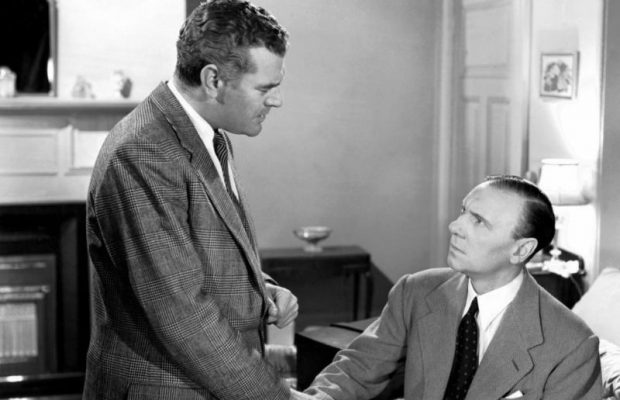
Toronto Film Society presented Home at Seven [aka Murder on Monday] (1952) on Monday, April 9, 2018 in a double bill with The Sleeping Tiger as part of the Season 70 Monday Evening Film Buff Series, Programme 7.
Production Company: British Lion. Producer: Maurice Cowan. Director: Ralph Richardson. Script: Anatole de Grunwald. Based on the play by R.C. Sherriff, “Home at Seven”. Cinematography: Jack Hildyard, Edward Scaife. Music: Malcolm Arnold. Editor: Bert Bates.
Cast: Ralph Richardson (David Preston), Margaret Leighton (Janet Preston), Jack Hawkins (Dr. Sparling), Campbell Singer (Inspector Hemingway), Michael Shepley (Major Watson), Margaret Withers (Mrs. Watson), Meriel Forbes (Peggy Dobson), Frederick Piper (Mr. Petherbridge), Diana Beaumont (Ellen).
British Lion Films was the production company which made tonight’s first film Home at Seven. The company was registered in 1927 and the Chairman, writer Edgar Wallace, received £10,000 in company shares in return for the film rights to all his novels and plays. By 1929, the company was £50,000 in debt and, to remain competitive in the sound era, British Lion concentrated on making inexpensive films with required British content known as “quota quickies.” When Wallace died in 1932, the company began importing American and European films, and limited production to filming cabaret, music hall, radio and variety entertainers to meet is renter’s quota. By mid-1934, it showed a small profit and in 1935 signed a distribution deal with Republic Pictures and returned to producing full-scale features.
In 1945, the production company was taken over by Alexander Korda, who quickly bought a controlling interest. He brought along many of his old team and made a number of critically successful films, but by 1948 the company was once again near bankruptcy. The newly established National Film Finance Corporation baled Korda out with two separate loans which totaled three million pounds. A month before the new loan was announced, Korda stepped down to become ‘production adviser’, and with that change, subsequent production budgets were nearly halved.
Ralph Richardson, a close friend of Korda’s, and an amiable member of Korda’s creative team, was given his only chance to direct in his long career with Home at Seven, which was one of a projected series of films made of current West End stage successes. Korda, in his new role of production adviser, supervised, helping to give Home at Seven the structure, tone, timing, and feeling of some of his earlier films such as 1937s The Man Who Worked Miracles and 1948s The Fallen Idol, which incidentally also starred Ralph Richardson, and all of which had celebrated the theme of the “little man”. Home at Seven foregrounded the sheer claustrophobia of lower middle-class life, and the way in which the psyche may invent ingenious escape routes. Certainly the film gives the impression of somebody, probably Richardson, thinking through Korda’s body of work, albeit at high speed— as it was made in only thirteen days. Korda was reportedly pleased with the whole process.
Sources: British Cinema of the 1950s: The Decline of Deference by Sue Harper and Vincent Porter (2003); The Encyclopedia of British Film (Fourth Edition) edited by Brian McFarlane and associate editor Anthony Slide (2013)
Introduction by Caren Feldman
Plot: Meek and mild-mannered bank clerk David Preston (Ralph Richardson) returns home after work, one evening, to find his wife, Janet (Margaret Leighton), distraught, as he had been missing for more than 24 hours. David recalls nothing from the period, and when the news reports that a steward at his club had been murdered in that time, he hurries to visit his friend, Dr. Sparling (Jack Hawkins). There he confesses his growing fear that he was responsible for the crime, as he hated the murdered man.
Critical Reception: This was the first and only film directed by the famous actor, who had starred on stage in R.C. Sherriff’s source play. His low-key approach to direction was credited by some critics to inexperience and playing safe but convincing, nevertheless, allowing the viewer to really identify with the character’s plight. According to a recent review in Time Out, as an actor, “His air of concerned bewilderment is just right for this modest suspenser; and in his only time behind the camera, he makes a decent fist of maintaining tension, although the proscenium arch never seems far away”.
Ralph Richardson (1902-1983): Knighted in 1947, he was one of the greatest English stage and film actors of the 20th century, along with John Gielgud, Laurence Olivier, and Alec Guinness. He began his stage career in the 1920s and joined the Old Vic company in 1931, thereafter working regularly in London’s West theatres and Broadway in a variety of classic and modern roles. His film career began in 1933 with The Return of Bulldog Drummond where, as a review in The Times commented, he “makes Drummond as brave and stupid on the screen as he is in print”. From then onwards, he regularly alternated work on the stage and on film, treating both with equal seriousness and conviction. Films of this period included Things to Come (1936) and, after war service in World War II, one of his finest roles in Carol Reed’s The Fallen Idol (1948). Other major films of this period were The Heiress (1949); An Outcast of the Islands (1951); The Sound Barrier (1952); and Laurence Olivier’s Richard III (1956), in which he played the Duke of Buckingham. These were followed, along with several stage roles, by Our Man in Havana (1959) and Long Day’s Journey into Night (1962). He made 13 films in all, during the 1960s, including Khartoum and Doctor Zhivago, as well as starring on television in a series based on P.G. Wodehouse’s “Blandings Castle” stories. In the 1970s and 1980s, he worked frequently on stage for the newly formed National Theatre, as well as in commercial West End productions and in such films as Time Bandits and Greystoke, the latter released after his death in 1983. Stage and film director Peter Hall called him “the greatest actor I have ever worked with” and he was much admired by the younger generation of actors, such as Albert Finney.
Margaret Leighton (1922-1976): She made her stage début 1938 and then became a star at the Old Vic theatre and made her début on Broadway in Shakespeare’s Henry IV, where she co-starred with Laurence Olivier and Ralph Richardson during a visit by the Old Vic company in 1946. Her film career began with The Winslow Boy, in 1948, and was followed over the next few years by roles in Bonnie Prince Charlie (1948); Alfred Hitchcock’s Under Capricorn (1949); and a steady series of other films, over the next few decades, intermingled with some award-winning roles on Broadway. Her most notable later films were The Best Man (1964); John Ford’s Seven Women (1966); and especially Joseph Losey’s The Go-Between (1971), for which she won the British BAFTA Award for Best Supporting Actress. She also won several Emmy Awards for TV appearances.
Jack Hawkins (1910-1973): Born and educated in London, he showed an early interest in the stage, making his London stage début at the age of 11 and appearing on Broadway at the age of 18. Theatre dominated his work in the 1930s, in the company of some of the leading figures of the period, but he began also to work in film; mostly, in the “quota quickies” of the period (films made quickly and cheaply to conform to regulations about the amount of screen time allocated to British films, in order to strike a balance against Hollywood imports). Most of these had little value, though they included Alfred Hitchcock’s The Lodger (1927). He served in the military during World War II and returned to the stage almost immediately after leaving the army. Primarily for financial reasons, he signed a contract with the leading producer, Alexander Korda, and, after the resounding flop Bonnie Prince Charlie, had well-received roles in Carol Reed’s The Fallen Idol and Powell and Pressburger’s The Small Back Room (1949). Several equally good roles followed in The Elusive Pimpernel; No Highway in the Sky; and Home at Seven, establishing him as a major star in British cinema. Mandy (1952) and The Cruel Sea (1953) were hugely popular, winning him a Hollywood role in Howard Hawks’ epic Land of the Pharaohs (1955) and then, two years later, one of the three starring roles in The Bridge on the River Kwai. Later work included Lawrence of Arabia; Ben-Hur; Zulu; Lord Jim; and one of his personal favourites, The League of Gentlemen (1960). A heavy chain smoker for years, he began to develop throat problems and was diagnosed with throat cancer in 1965; he started to lose his voice and, after his entire larynx was removed, had to rely on various mechanical devices and dubbing, while keeping his dialogue to a minimum. He continued, nevertheless, to work steadily into the 1970s, until his death in 1973.
Malcolm Arnold (1921-2006): A prolific and hugely popular composer of both classical and popular music, he wrote the sores for over 60 films as well as numerous orchestral, piano, and chamber music works. His best-known film score was for The Bridge on the River Kwai and he worked often for other major directors, such as Joseph Losey, Carol Reed, and John Huston.
Notes by Graham Petrie

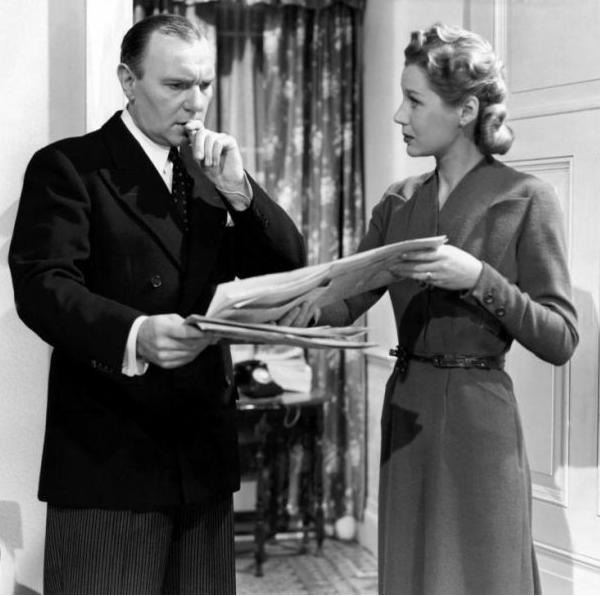
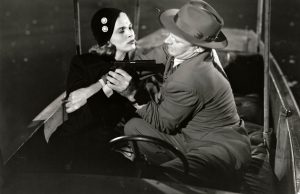
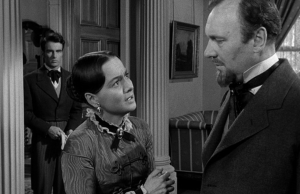
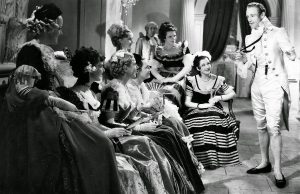






Leave a Reply